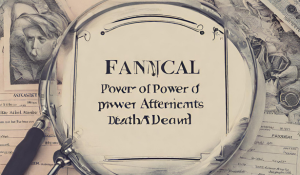Financial Power of Attorney after Death

Power of attorney is a document containing information about a person nominated to decide on behalf of the person issuing this document. It will come into the act when the nominating person dies or is living but is incapacitated, unconscious, or unavailable.
The term is "the authority to act for another person in specified or all legal or financial matters."
Moreover, power of attorney and attorney-in-fact are used interchangeably. Therefore, you can appoint an attorney-in-fact or a power of attorney.
However, specific legal requirements are required to make a power of attorney authenticated. Therefore, you cannot just nominate a person as a power of attorney but must fulfill all legal requirements to make it a valid document.
This article will discuss financial power of attorney after death, its legal requirements, and other related information.
So, let us roll on!
Types of Power of Attorney
Depending on the principal's requirements, there are numerous types of power of attorney. Considering their legal needs, POAs fall into five distinct classes.
-
Springing POA
The type of power of attorney that comes into the act when a specific specified condition is met is a springing POA. For instance, the nominated person can decide if the principal becomes incapacitated. Moreover, a springing POA generally does have legal authority.
-
General Power of Attorney
A general power of attorney acts parallel with the principal. Therefore, the general POA can act in all situations, even if the principal makes these decisions.
-
Durable and Non-Durable POA
In a durable power of attorney, the agent acts on behalf of the principal if he becomes incapacitated. In contrast, under a non-durable power of attorney, the agent can no longer act on the principal's behalf if incapacitated.
Thus, non-durable POA is generally not advisable, especially in the case of estate planning.
-
Medical POA
As the name suggests, a medical power of attorney has a limited scope. Agents can only make medical-related decisions for the principal. These medical conditions include medication, surgery, healthcare services, or end-of-life care.
-
Financial Power of Attorney
Financial power of attorney is the most sensitive category in that it authorizes an agent to make financial decisions on behalf of the principal. It includes all financial decisions, including filing taxes, retirement benefits, and paying bills.
Let us learn more about the financial power of attorney in detail.
Requirements of Financial Power of Attorney
Financial POA needs to fulfill specific requirements to be legally authenticated. The authority of power of attorney is flexible and depends on the nature of the contract. Principals can allow full financial power or limit it to specific properties only.
Here are key components that make financial power of attorney a valid document.
- There are pre-designed documents for the nomination of a financial power of attorney. So, you have to fill out these forms as they prove the legality of the power.
- Few states require you to fill the form over a notarized document so you can check with your lawyer before nominating someone.
- You will need two witnesses who will also sign the document and should not benefit from the power of attorney.
- Banks also need their documents, which should be completed in addition to the state form.
- Financial power of attorney after the death of the principal is extinguished. An executor will take charge of the matters if the deceased has made the last will.
Abuse of Power of Attorney
There are scenarios where a nominated person could use his power of attorney for personal benefit. Although POA automatically expires upon the principal's death, the agent may exploit the situation.
Furthermore, inheritance hijacking is the legal term for the power of attorney misuse. For instance, the agent could unlawfully transfer assets to his name without bringing them to the knowledge of the family.
Therefore, how can you stop the agent from misusing the power of attorney? Here are a few remedies for your knowledge.
- If a misuse is evident, you can sue the agent, as it is a crime.
- The district attorney is pursuing legal charges for stealing estate.
- Family members can file a civil petition for misappropriation of assets.
In short, if you become aware of such fraud, you should file suit after consultation with your lawyer because it is an act that includes stiff fines and jail sentences.
Power of Attorney vs Will
Power of attorney addresses the wishes of a living person, while a will outlines the wishes of the person after his death. Moreover, numerous key identifying factors segregate POA and a will.
Here are a few of these.
-
Agent vs Executor
The principal appoints an agent as the power of attorney while an executor for his will. Therefore, the person liable to make decisions while the principal is alive is called an agent. Contrarily, the person vested with decision-making power after the principal's death is an executor.
Furthermore, you can name the same person as an agent and executor, but you must prepare both agent and executor documents separately.
-
If there is a Will
An agent's responsibilities are relieved if the principal has left behind a will. Therefore, an executioner will take control of the distribution of the estate.
The principal can name the same person as an agent and executor. However, his responsibilities will depend on the last or testament document.
Moreover, the executioner of the will is responsible for ensuring the assets' distribution according to the deceased's wishes and instructions. Likewise, this distribution takes place through the probate process.
-
If there is no Will
If the deceased has left behind no will, the estate must pass the probate phase.
Probate is a process through which the court appoints an administrator who oversees the distribution of assets. Therefore, the primary point of difference between a will and trust is that trust does not have to go through the probate process.
Frequently Asked Questions
What happens to the financial power of attorney after the principal's death?
The power of attorney dies with the principal. A POA is a document that grants a person permission to act on their behalf only during life.
Who has power of attorney after death if there is a will?
A power of attorney rests with the executioner if the principal dies and he leaves behind a will.
Who has power of attorney after death if there is no will?
The power of attorney automatically rests with the state law if the deceased has not left behind a will. Hence, the deceased's assets are distributed amongst the families per prevailing state laws (i.e., the state's intestacy statutes).
Parting Thoughts
Financial power of attorney after death also dies; therefore, the agent cannot make any decisions on behalf of the deceased, which means that the POA has a responsibility until the principal's life.
Furthermore, decision-making power transfers to an execution after the principal's death if there is a will. However, the court appoints an administrator to look after the estate distribution process without the will.
Likewise, the family of the deceased principal has the right to sue the agent if they find illegal use of the power of attorney. Such an offense is punishable by fine and imprisonment.
That concludes our discussion about the financial power of attorney after death. We hope you enjoyed reading this article, and please leave your feedback in the comments section.


